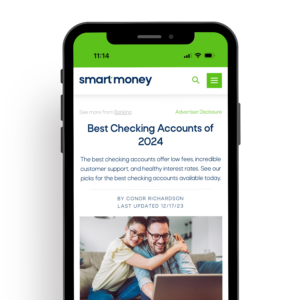Takeaways
- Wedding funds can be used to save for pre-wedding, wedding, and post-wedding items.
- Wedding funds can be stashed in savings accounts to accrue compounding interest.
- The average U.S. wedding costs over $35,000; saving in advance reduces your burden.
- High-priced items like a wedding dress, groom’s suite, and catering can increase costs.
- One of the most considerable financial levers to pull for the cost of a wedding is the guest count.
Some of the links in this article are from advertising partners of Smart Money, which does not influence our evaluations or recommendations. We work to provide you with accurate and reliable information. Our opinions are our own.
Saving for a wedding can spike your anxiety. Most people consider scraping their cash together for their special day too late. By the time you have found your future spouse, you are probably behind the savings curve, especially given the rise in the cost of the average wedding.
There might be a stigma behind saving for a wedding fund too early. However, you don’t want to be caught flat-footed and unable to afford to put on the wedding you deserve. Many young professionals are taking matters into their own hands. By starting a wedding fund, you can jump on the savings journey, hedge against inflation, and not rely solely on friends and family to support your engagement, wedding, and honeymoon activities.
As the average age for weddings has been rising, more people are starting to take matters into their own hands and amass a wedding fund to celebrate their big day.
What is a Wedding Fund?
A wedding fund is a savings fund for you (and your future spouse) to stash cash away for engagement activities, your wedding and reception, and honeymoon expenses. According to The Knot, the average wedding costs around $35,000, which most people don't have on hand [1]. It might take months or years to save that amount, but if you start early enough, just like investing in stocks, you can accrue a sizable balance over time.
Wedding funds can be stored at banks or credit unions that offer quickly accessible checking or savings funds. You can aim to save for pre-wedding festivities, like your engagement party, ring, or celebratory trip. Of course, you will also need to consider paying for the wedding and reception. Lastly, you will have to fund your honeymoon fun. A wedding fund that saves for all or part of these activities can make a huge difference.
Get Smart With Your Money
Fresh weekly articles delivered straight to your inbox.
Enter your name and email for free tips and tricks.

5 Steps to Create Your Wedding Fund
Weddings are meant to celebrate your relationship and shouldn’t be clouded with worrying about how to finance the event. Start planning your wedding fund today so you can focus solely on what matters most. Here are five steps to create your wedding fund:
1. Set Up a Savings Account
Super planners and savers should probably investigate opening a high-yield savings account. You might be in a situation where you are proactively saving for your wedding and might not even be dating someone. If this describes you, you can use this fund to make some serious savings and accrue funds for pre-wedding events like buying the engagement ring or throwing an engagement party. Being several years away from your wedding day allows your funds to take advantage of compound interest.
Alternatively, if you are close to your wedding date (say within a year), setting up a high yield checking account could be the right move for you. This will allow you to contribute funds, deposit checks or gifts, and easily access your funds while you pay vendor and venue deposits and actively use these funds to purchase critical wedding items.
2. Name Your Account
Savings hacks can help you reach your savings goals quickly. One psychological tip and trick to spur you to save more is to name your savings account.
Making your account name specific to your savings goal will boost your savings and trigger you to focus on reaching your goals.
Learn More -> How Much Should You Keep in Your Savings Account?

Member FDIC
Axos Bank® Rewards Checking
Smart Money Rating: 5/5
APY: 3.30% with No Minimum Balance
Bonus Offer: Up to $300 Bonus (Terms Apply)
3. Determine Your Budget
Setting a budget for your wedding might be difficult if you haven’t even met your significant other yet. However, whether you have met your future spouse or not, you can use the average wedding cost of $35,000 in 2023 as a proxy for what it will cost in the future.
Remember to factor in inflation and the rising costs of weddings. If the average wedding costs $35,000 today, what will it cost in three to five years? That is why making regular contributions to increase the size of your fund will mitigate being caught off guard when you do pay for your wedding.
4. Make Regular Contributions
With your budget in mind, you can calculate how much you need to start saving per month to meet your goal. Whether you are using the 50/30/20 or the Passion Budget, you should start saving as much as you can. This could be $25, $50 or $100 deposits into your account.
By automating your finances, you can remove the headache of even having to think about your wedding fund once you have it up and running. After setting your contributions, you can work on increasing this amount each year, just like retirement savings, until you reach your savings target. Revisiting your savings should be done at least annually, and it is part of actively monitoring your progress.
Learn More -> Try our 50/30/20 Calculator
5. Monitor Your Progress
Now that you have your savings account set up, have determined your savings goals, specifically named your account, and are making regular contributions, all you need to do is monitor your savings progress.
For those who want to achieve financial independence or if you are a HENRY, you might meet your savings goals quickly. Once you hit your number, consider investing your money into stocks or bonds to get a higher rate of return than a savings account. For example, you could explore dividend stocks to receive cash from dividends and simultaneously enjoy capital appreciation.
How to Budget for a Wedding
Weddings can cost hundreds of thousands of dollars or much less. Whether you want a blowout event at an expensive venue or want to keep the party contained to a beautiful backyard celebration, planning for how much you are going to spend on your wedding is often one of the first times you and your significant other will discuss finances.
Need help noodling over what expenses go into planning for a wedding? To get you started, check out Smart Money’s Wedding Calculator below:
Calculator
How much will your wedding cost?
Pre-Wedding
Wedding Day
Add It Up
When you get into the gritty details of the planning process, you might be overwhelmed with how much there is to contemplate. From selecting the amount you want to spend on flowers to the cost of the dress or suit, it is wise to think about your budget holistically. Being smart with planning also means growing your funds and storing your cash in the best place.
Best Place for Your Wedding Fund
Stashing your wedding fund in the right place can save you thousands of dollars in lost purchasing power and boost your savings with interest income. The best place to put your wedding fund is probably in a high-yield savings account with a bank or credit union.
With annual percentage yields for some accounts ballooning to 5%, it makes financial sense to place your funds here to accumulate interest and take advantage of compounding interest. Your wedding fund could be placed alongside your emergency fund or slush fund in one of these accounts to provide the financial flexibility to meet your wedding and financial goals
Alternatives to a Wedding Fund
Don’t have enough money to pay for your wedding in cash? You could finance the big event with a credit strategy. For example, you could take out a personal loan to pay for part of the event. You could use this moment to make on-time payments and build your credit score.
Another approach is to be smart about how you are financing wedding costs. Instead of paying with cash, you could use your credit card to pay for vendors and earn bonus points in the process. You can dip into your wedding fund to pay off your credit card debt from your wedding expenses. Depending on your credit card rewards program – travel or cash back – you could save some serious money or use your points for free flights to your destination honeymoon.

Acorns Website
Acorns Investing App
Intro Offer: $20 Bonus Investment
Recommended For: Beginner Investors
Annual Fee: N/A
Smart Money Rating: 5/5
Smart Summary
Getting married is one of life’s big events. Financially preparing yourself with the right savings strategy can be the difference between thoroughly enjoying the event and staying present or worrying about how to pay for it all. Give yourself the gift of saving early; choose a high-yield savings account where you can accrue interest and protect your nest egg from inflation. Aligning your financial future will send you in the right direction, which might start with a conversation about a wedding fund.
(1) The Knot. The Knot 2023 Real Wedding Survey. Last Accessed April 15, 2024.











